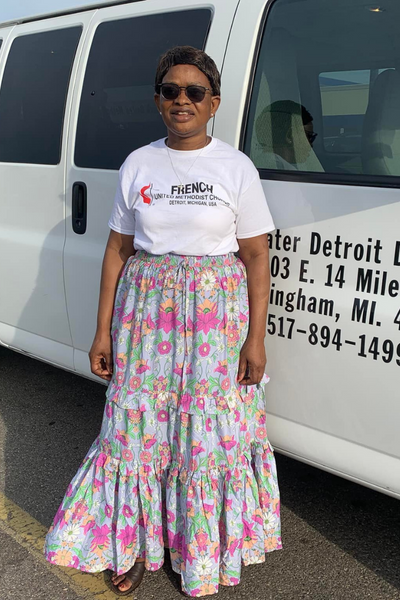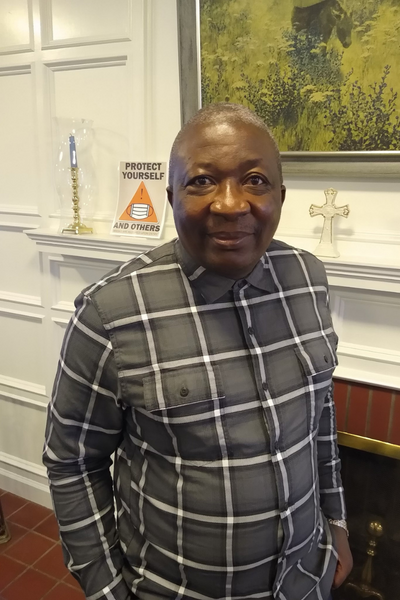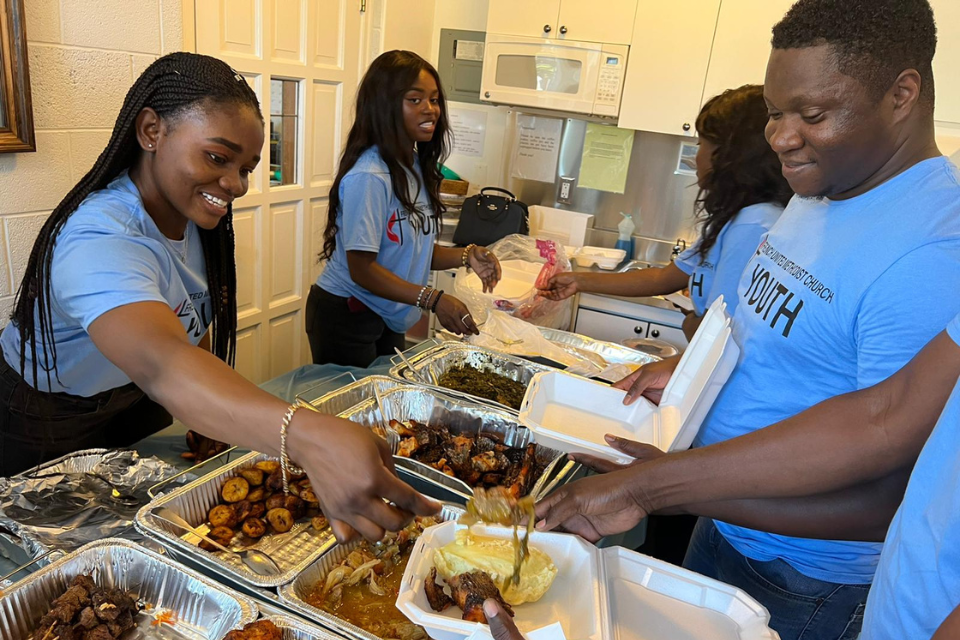STEP TWO: French UMC in Detroit cares for refugees and asylum seekers in their community. They prepare a monthly dinner of traditional African foods for those in the Freedom House shelter.
JAMES DEATON
Content Editor
This is the second story in a series highlighting the recipients of a 2021 Mustard Seed Migration Grant and the new ministries that were started. Congregations are encouraged to read these stories and find ways they can do similar justice advocacy work in their neighborhoods and communities. The deadline for this year is September 30, 2022, for those congregations interested in applying. For more information, refer to this earlier news story and this story about Dearborn First.
The food we eat gives nourishment, but it also connects us with places and people we know and love. Have you ever been away from home and experienced a hunger for familiar tastes or smells? Have you ever had a particular food remind you of someone you miss? It’s a common desire, one that cuts to the heart of who we are as human beings.
Rev. Gertrude Mukalay Mwadi, co-pastor of French United Methodist Church of the African Diaspora, understands this need as she has ministered to refugees and asylum seekers from French-speaking countries in Africa. Her heart goes out to people trying to start a new life, many of whom are separated from family and friends and lack resources to make ends meet.
And it has led her and the members of French UMC to create a new evangelistic ministry, initially funded by a Mustard Seed Migration Grant, that prepares a once-a-month dinner of traditional African foods offered to those residing at the temporary Freedom House shelter in Detroit. It also enables church members to develop friendships and build community.

Started as a Greater Detroit District church plant in 2016, French UMC is pastored by Revs. Gertrude Mukalay Mwadi and John Kabala Ilunga Ngoie, and they meet at Embury United Methodist Church in Birmingham, MI. This Congolese clergy couple graduated from Mulungushi Seminary in the Democratic Republic of Congo (DRC) and Africa University in Zimbabwe. They eventually came to Wesley Theological Seminary in Washington, D.C., as exchange students. They speak six African languages, including French, and served as pastors in the DRC and Zimbabwe before coming to Michigan.
To minister to persons from French-speaking countries, the pastors of French UMC began visiting Freedom House on a regular basis, inviting people to worship God with them and hear God’s Word in their primary language. Many of these immigrants come from the 20-plus countries of Africa where French is spoken, including Senegal, Rwanda, Côte d’Ivoire, and the Democratic Republic of Congo. The COVID-19 pandemic has provided challenges to sustained visits, but the congregation is flourishing and, in fact, most of the members of French UMC have come from Freedom House. Pastor Gertrude estimates that 90 percent of the church members lived there at some point since arriving in the United States.
The idea for a food ministry to asylum seekers and refugees from Africa had been planted long before Pastor Gertrude and French UMC knew about the Mustard Seed Migration Grant. It was something they were already in good practice doing among their members.
Early on in their ministry at French UMC, Pastors Gertrude and John hosted church activities in their basement, such as choir practice, Bible study, and prayer time, and there was usually a meal prepared for everyone who came.
Pastor Gertrude recalls, “Even before we were given … the [grant] money, we were always doing [something out of the] small money we are given as the pastor. … Each time they come [to our home] I cook for them African food so that they eat and then they go home. … We are always doing in the church according to the money we have. … We always do that.”
Georges Mushagalusa Buhamba-hamba, a member of French UMC and a former Freedom House resident from the Democratic Republic of Congo, knows the compassionate care and hospitality of Pastor Gertrude and French UMC. Georges remembers one instance where she helped during a time of serious need after a hospital stay.
Georges was very sick with pneumonia and was not able to eat while a patient at the hospital. After two weeks he got better and returned to Freedom House late one evening, but he was still extremely weak and hungry. Georges then called Pastor Gertrude and asked if she could prepare a traditional African meal for him. She was glad to help this friend in need.
“And that night [Pastor Gertrude] was obliged to cook foufou [dough-like food made of grain], cassava, and beef and fish,” he remembers. “The pastor brought me that food at Freedom House at 12 or 1am, after … leaving the hospital. I ate and [felt] very good in the morning.”

Georges first got to know Pastor Gertrude when she came to Freedom House to visit church members and to invite others to worship. He wanted to find a church to pray but didn’t understand English, so he was interested in visiting French UMC and learning more.
The congregation has been very supportive of French-speaking refugees and asylum seekers like Georges through the making of meals, and this led them to begin their new African Meals for New Immigrants ministry. Once a month they prepare a traditional African meal for Freedom House residents. It’s not just for church members but anyone who wants to partake.
This free meal is a gift. The ingredients to prepare these meals are expensive, especially with the recent rise in inflation, and so the meal is a respite, a taste of home, for these people looking to find their way in a place that feels strange and uncomfortable. Pastor Gertrude points to the heart of this ministry: “To me, the African meal [is] like helping people feel home. They are missing that food.”
The open-table philosophy is a way for French UMC to welcome and support these children of God, no matter which country they come from or which faith they hold close. It’s meeting them where they are and addressing tangible needs. It’s a belief rooted in the spirit of Christ.
Pastor Gertrude sees this clearly: “Jesus Christ, when he was preaching … people followed him because they needed food. He did [miracles] for people to eat. But in our context, we cannot do that. Maybe our miracle can come from the congregation, so that when we are preaching the Word of God, people also need to be accepted in [their] context, [through] food [or] housing.”
French UMC witnesses to the transformation that happens when feeding hungry bellies with food and nourishing souls with good news go hand in hand.
Georges is living proof. He has found a trusted faith family, some semblance of stability, while he’s waiting for his asylum request to be fully processed. He’s been on hold for over a year waiting for an interview in Chicago so his case can move forward. The church has been like family to him since his wife and children remain in the Democratic Republic of Congo.
Georges obtained a work permit and has found a job as a production operator, but the employment is unpredictable. Sometimes the company shuts down for weeks at a time, and employees like Georges do not get paid when they don’t work. Then how does one buy groceries? What about gas for driving to work, to church? These challenges start to mount quickly for refugees and asylum seekers trying to build a new life.
Another big challenge Georges faced is housing. People can only stay at Freedom House two years, so finding an affordable place to rent while awaiting an asylum request to be approved or denied creates anxiety and pressure. Georges did find a place to rent, but the instability in employment and the continual delays in his asylum request make the situation precarious.
Pastor Gertrude encourages congregations to look for people in their communities like Georges and continue supporting them through all of life’s challenges. She encourages churches to set aside money in their financial planning to assist refugees as they settle into a home. There are also practical items like home furnishings and clothing that churches can provide. Big Beaver UMC in Troy has helped members of French UMC, including Georges, with such things.
The difficulties refugees and asylum seekers face are bearable when people are encouraged and uplifted by caring communities. “Papa Georges,” as he is lovingly called by Pastor Gertrude and others at the church, has found a home with the people of French UMC, a faith community committed to their neighbors in need.
French UMC’s ministry with immigrants is an EngageMI project. Congregations and individuals wanting to support this ministry can submit a check to the Michigan Conference at 1161 East Clark Road, Suite 212, DeWitt MI 48820. Write this phrase in the memo line: “CCMM #3055.”

